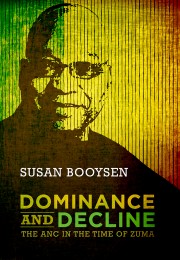 “There is no shortage of books about the modern ANC. However this one provides evidence-based answers to two key questions that are frequently asked but seldom answered persuasively. The questions are what is the current basis of the ANC’s support and how likely is this support to endure.
“There is no shortage of books about the modern ANC. However this one provides evidence-based answers to two key questions that are frequently asked but seldom answered persuasively. The questions are what is the current basis of the ANC’s support and how likely is this support to endure.
— Tom Lodge, Professor of Peace and Conflict Studies in the Department of Politics and Public Administration at the University of Limerick, Ireland”
As Jacob Zuma moves into the twilight years of his presidencies of both the African National Congress (ANC) and of South Africa, this book takes stock of the Zuma-led administration and its impact on the ANC. Dominance and Decline: The ANC in the Time of Zuma combines hard-hitting arguments with astute analysis. Susan Booysen shows how the ANC has become centred on the personage of Zuma, and that its defence of his extremely flawed leadership undermines the party’s capacity to govern competently, and to protect its long term future.
Following on from her first book, The African National Congress and the Regeneration of Power (2011), Booysen delves deeper into the four faces of power that characterise the ANC. Her principal argument is that the state is failing as the president’s interests increasingly supersede those of party and state. Organisationally, the ANC has become a hegemon riven by factions, as the internal blocs battle for core positions of power and control. Meanwhile, the Zuma-controlled ANC has witnessed the implosion of the tripartite alliance and decimation of its youth, women’s and veterans’ leagues. Electorally, the leading party has been ceding ground to increasingly assertive opposition parties. And on the policy front, it is faltering through poor implementation and a regurgitation of old ideas. As Zuma’s replacements start competing and succession politics takes shape, Booysen considers whether the ANC will recover from the damage wrought under Zuma’s reign and attain its former glory. Ultimately, she believes that while the damage is irrevocable, the electorate may still reward the ANC for transcending the Zuma years.
This is a must-have reference book on the development of the modern ANC. With rigour and incisiveness, Booysen offers scholars and researchers a coherent framework for considering future patterns in the ANC and its hold on political power.

